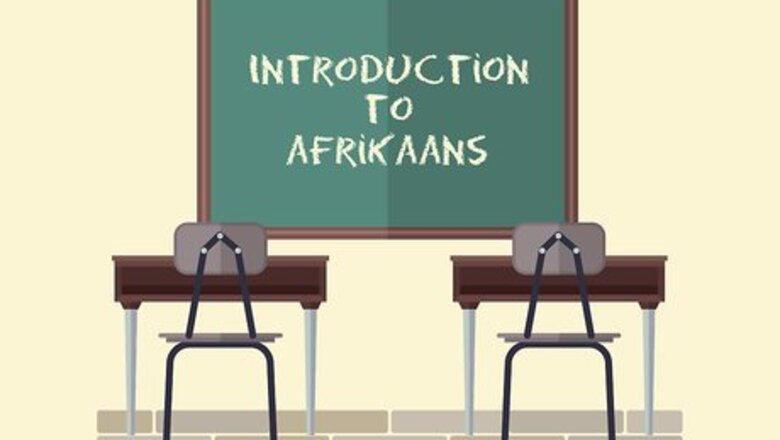
views
X
Research source
Learning to speak another language like Afrikaans is a great adventure! Start by learning common words and phrases. Then work on your pronunciation with audio CDs or a language-learning software. Once you start speaking in Afrikaans, try not to worry about making mistakes.
Learning Common Words and Phrases
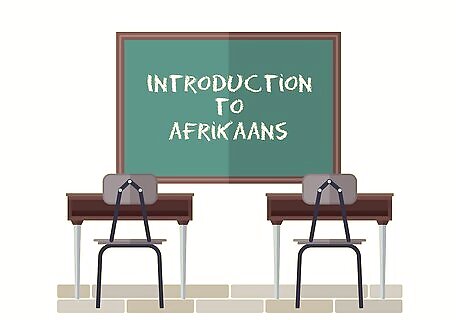
Take an introductory Afrikaans class. Enroll in an introductory class at a local community college, or at a language learning center. You can also find organizations dedicated to language learning online. Online classes are convenient because you can learn at your own pace. Taking an introductory class will help you develop a solid foundation in the language. The cost of introductory courses can range from $150 to $500.
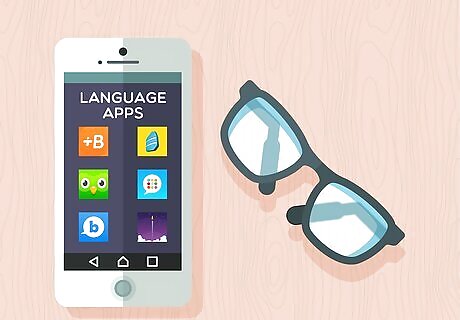
Download a language app. A variety of language apps exist today that can assist you in learning common words and phrases in any language, including Afrikaans. The benefit of apps is that they enable you to learn on the go. For example, with language apps, you can review common words and phrases while on the bus or train, during your lunch break, or before bed. Check out language apps like Duolingo, Babbel, Leaf, Mindsnacks, Memrise, and others.
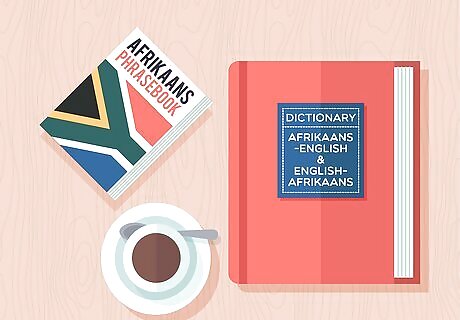
Invest in a phrasebook and dictionary. If you are a visual learner, choose picture dictionaries and books. If you are an auditory learner, look for books that come with audio CDs. If you are a tactile learner, look for books that contain hands-on activities and learning exercises. Afrikaans textbooks are also a great way to learn common words and phrases. You can purchase Afrikaans phrasebooks and dictionaries at a local bookstore or online.

Set a goal to learn 100 words and phrases at a time. Flashcards are a great tool in helping you learn a new language. Write down the most common words, phrases, and verbs for your first 100 flashcards. These words and phrases should be easy to picture and common in your native language like, "boy," "girl," "hi," "my name is," and "how are you." Start with the most frequently used and most practical words. It should take you two to three weeks to learn a 100 words, depending on your study time. If 100 words are too much, then start with 20 to 50 words (any number you are comfortable with). If you dread the idea of writing down words, then download a free flashcard app on your smartphone, tablet, or computer. You will be able to make virtual flashcards complete with pictures and sounds in an instant.
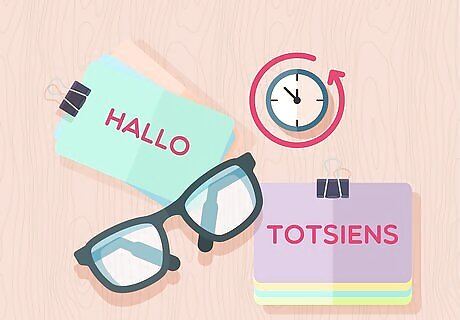
Study your flashcards for one hour each day. You can break the hour up into 15 or 30 minute blocks if you need to. Study your flashcards during school or work breaks, while on the train or bus, or whenever you have down time.
Working on Pronunciation
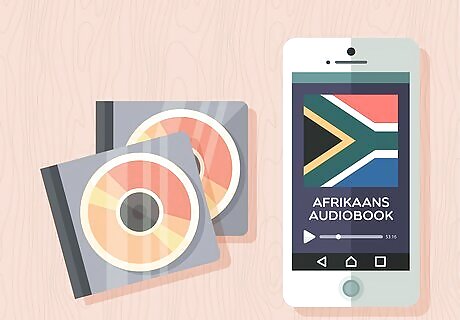
Invest in an Afrikaans audio CD. Listen to the audio CD while you are driving, during your downtime, and before bed. Pay attention to how the words are pronounced and say the words out loud. You can purchase audio CDs online, from your local bookstore, or from a language learning center. Many phrasebooks and textbooks also come with audio CDs.
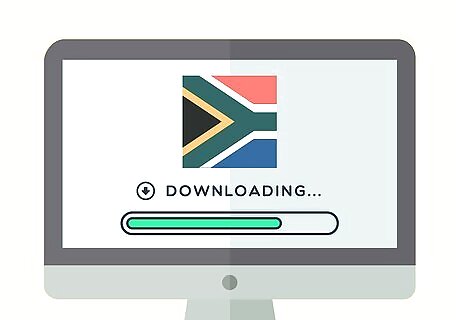
Use a language-learning software. Language-learning software, like Rosetta Stone or Speechace, is another great way to work on your pronunciation. It typically uses speech recognition technology to develop and improve your pronunciation. The cost of a language-learning software can range from $100 to $300.
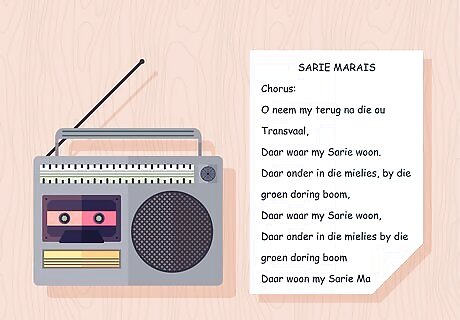
Learn the lyrics of Afrikaans songs. Look up the lyrics of popular Afrikaans songs. Print the lyrics out. First listen to the song and how the words are pronounced. Then follow along with your lyrics in hand. Finally, try singing along once you have the rhythm down. Learn the lyrics of popular Afrikaans songs by musicians like Kurt Darren, Snotkop, Steve Hofmyr, Juanita du Plessis, Emo Adams, Bok van Blerk, and the like. Afrikaans podcasts are also a great way to listen to local radio stations in South Africa.

Watch Afrikaans TV shows and films with the subtitles (in Afrikaans) on. Focus on the way the actors are speaking and how they are pronouncing certain words. If there is a word you are unfamiliar with, write it down. Look up the definition and pronunciation at a later time. To make it fun, watch the dubbed version of your favorite movie or TV series in Afrikaans like Lord of the Rings or Harry Potter.

Read Afrikaans newspapers, magazines, and literature out loud. As you read out loud, do not be afraid to imitate the accent of a true native speaker, even if you think you sound silly. If you come across an unfamiliar word, write it down, look up its definition and pronunciation, and add it to your flashcards. Some examples of common Afrikaans newspapers are Afrikaans News24, Die Burger (for Cape provinces), Volksblad (for Free State), Beeld, and Republikien Online. A few examples of well-known Afrikaans literary writers are Sheila Cussons, Wilma Stockenström, Karel Schoeman, Elsa Joubert, and Etienne van Heerden.
Speaking Afrikaans
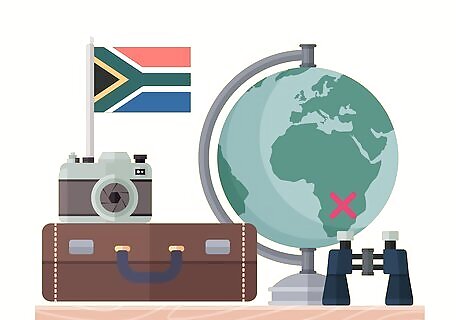
Travel to South Africa. Immersing yourself in the culture and language of South Africa is an ideal way to learn Afrikaans. It will force you to speak Afrikaans constantly. Enroll in a study abroad or exchange program for six months to a year in South Africa. You could also volunteer at an international organization based in South Africa over the summer, or simply plan a vacation to South Africa. While you are in South Africa, try to avoid speaking your native language as much as possible. To help you do this, carry around a phrasebook with you. Plan your trip ahead of time so you can budget appropriately. A trip to South Africa can range from $1,500 to $2,500, depending on the length of your trip and where you are flying from.

Talk to yourself in Afrikaans. Talking to yourself may seem silly at first, but it is a great way to practice speaking in Afrikaans. Talk to yourself about how your day went or what you are doing at the moment. You can even try holding an imaginary conversation with yourself.
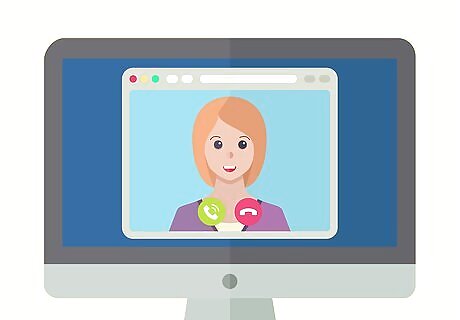
Connect with native speakers online. There are many Internet exchange programs available that will connect you to native speakers through video chat services. This is a great way to practice speaking Afrikaans if you are not able to travel to South Africa.
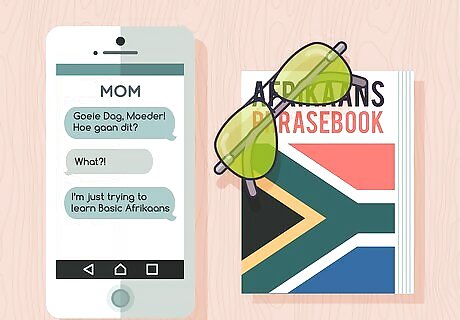
Ask a close friend or family member to learn Afrikaans with you. You all can quiz each other and practice speaking on a daily basis. This will help you learn the language faster. Tell your friend or family member why you want to learn Afrikaans and why they should too. By learning a new language you may be able to: Stall the onset of Alzheimer's and dementia. Improve your memory, ability to multi-task, and decision-making abilities. Build your confidence. Expand your employment opportunities. Cultivate an accepting and open mindset.















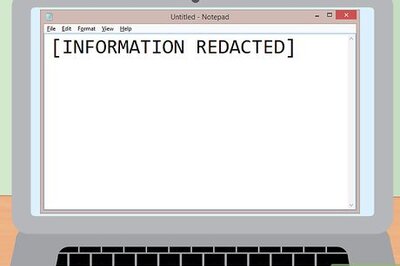



Comments
0 comment